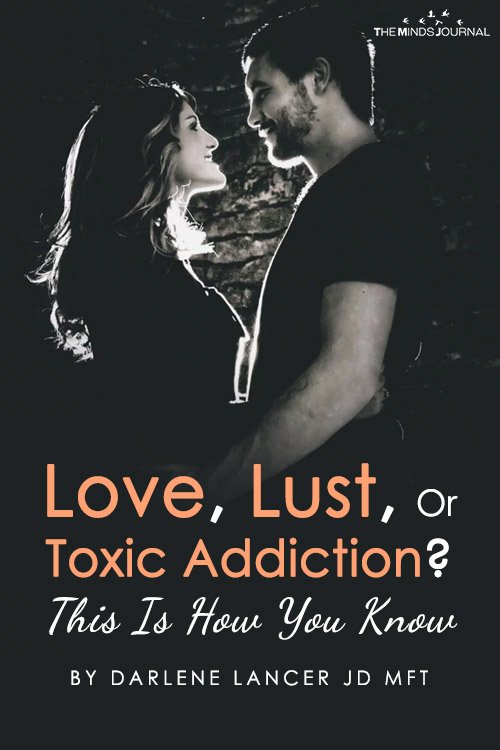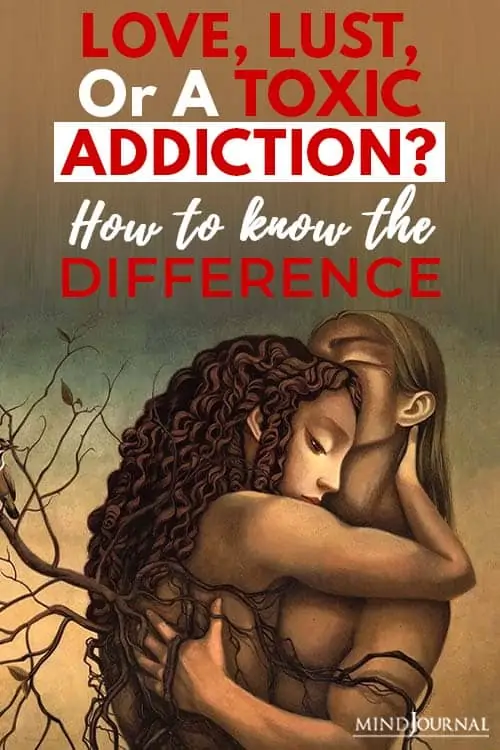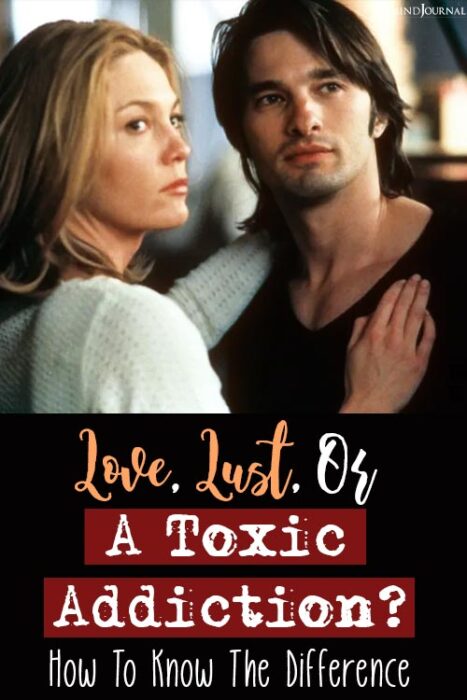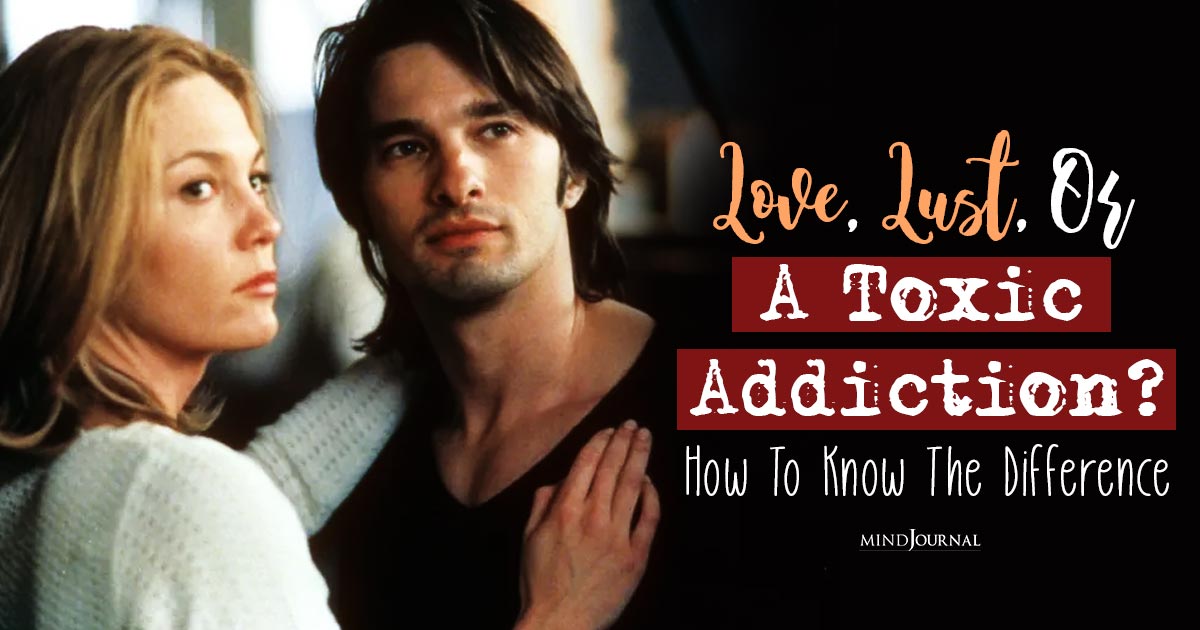Always remember there’s a difference between love, lust and toxic addiction. But how would you know which one you’re feeling? Let’s find out whether it’s love or lust or worse, toxic addiction?
Wonder whether you’re in love or lust? Whether your obsession with someone is a sign of love or addiction? Whether you’re staying in a troubled relationship because you’re addicted or in love?
It’s complicated, and lust and love and addiction don’t always exclude one another. Endless analyzing doesn’t help or change our feelings because we’re often driven by forces outside of our conscious awareness.
Initial attraction stirs up neurotransmitters and hormones that create the excitement of infatuation and a strong desire to be close and sexual with the person.
These chemicals and our emotional and psychological make-up can cause us to obfuscate reality and idealize the object of our attraction. Time spent in fantasy fuels our craving to be with him or her. This is normal when it doesn’t take over our lives.
Related: Eye Movement Can Reveal Love or Lust Intentions (Scientists find)
Love, Lust Or Toxic Addiction?
When it’s pure lust, we’re not too interested in spending time together without sex or the expectation of it. We don’t want to discuss real-life problems and may not even want to spend the night.
Fantasies are mostly sexual or about the person’s appearance and body, and we aren’t interested in meeting the person’s needs outside the bedroom – or maybe even inside!
Sex releases oxytocin, the love chemical that makes us want to nest with our partner.
As we get to know our lover, we may want to spend more or less time together, depending on what we learn.
At this juncture, our brain chemicals, as well as our attachment style and psychological issues, can lead us to become co-dependently attached through a romance or love addiction that feels like love but is more driven by our need for the chemical rush to avoid feelings of abandonment, depression, and low self-esteem.
Excitement and desire may be heightened by intrigue or our partner’s unpredictability or unavailability. We may remain attached and even crave our partner, but our discomfort or unhappiness grows.
Instead of focusing on that, our hunger to be with him or her takes center stage, despite the fact that disturbing facts or character traits arise that are hard to ignore.
We may feel controlled or neglected, unsafe or disrespected, or discover that our partner is unreliable, or lies manipulates, rages, has secrets or has a major problem, such as drug addiction or serious legal or financial troubles.
Nonetheless, we stay and don’t heed our better judgment to leave.
Increasingly, we hide our worries and doubts and rely on sex, romance, and fantasy to sustain the relationship. Out of sympathy, we might even be drawn to help and “rescue” our partner and/or try to change him or her back into the ideal we “fell” for. These are signs of addiction.
But lust can also lead to true love as we become attached to and get to know our sexual partner, and lust doesn’t always fade. I’ve seen couples married for decades that enjoy a vibrant sex life.
However, true love does require that we recognize our separateness and love our mate for who he or she truly is. There’s always some idealization in a new relationship, but true love endures when that fades. As the relationship grows, we develop trust and greater closeness.
Instead of trying to change our partner, we accept him or her. We want to share more of our time and life together, including our problems and friends and family.
Our lover’s needs, feelings, and happiness become important to us, and we think about planning a future together. When the passion is still there, we’re lucky to have both love and lust.
Love and codependency may coexist or be hard to differentiate because codependents idealize and often happily self-sacrifice for their partner.
When differences and serious problems are largely ignored, minimized, or rationalized, it looks more like codependency, because we’re not really seeing or loving the whole person.
Facing the truth would create inner conflict about our fear of emptiness and loneliness. Similarly, when our emphasis is on how our partner makes us feel or how he or she feels about us, our “love” is based on our self-centered, codependent needs.
Healthy relationships and codependent, addictive ones have very different trajectories. Healthy partners don’t “fall in love;” they “grow in love.” They’re not as driven by overwhelming, unconscious fears and needs.
Related: Is it Love or Lust: 5 Questions to Ask Yourself
The Difference Between Codependent Relationships And Healthy Relationships
Codependent Relationships
- Intense attraction – feel anxious.
- Idealize each other, ignoring differences.
- Fall “in love” and make commitments.
- Get to know one another.
- Become disappointed.
- Cling to the fantasy of love.
- Try to change our partner into our ideal.
- Feel resentful and unloved.
Healthy Relationships
- Attraction and friendship begin – feel comfortable.
- Attraction grows as they know each other.
- Acknowledge differences (or leave).
- Grow to love each other.
- Make commitments.
- Compromise needs.
- Love and acceptance of each other deepen.
- Feel supported and loved.
Codependency is an addiction and underlies all other addictions, including sex addiction, and romance, relationship, and love addiction. Lust and love and love and addiction can overlap.
When we heal our codependency, we can see whether love remains. We might even leave an unhealthy relationship and still love our ex.
Meanwhile, some things are knowable:
1. It takes time to love someone. Love at first sight may be triggered by many things, but it’s not love.
2. Having sex with strangers or frequent multiple partners is a sign of sexual addiction.
3. Compulsive activity, whether sexual or romantic, that feels out-of-control, such as compulsive sex, stalking, spying, constant calling, or texting is a sign of addiction.
4. Ignoring your partner’s boundaries, and abusing, controlling, or manipulating him or her (including people-pleasing or rescuing) are signs of addiction.
5. Using sex or a relationship to cope with emptiness, depression, anger, shame, or anxiety is a sign of addiction.
6. Using sex or romance to substitute for vulnerable, authentic intimacy is a symptom of addiction.
7. Staying in a painful relationship out of fear of abandonment or loneliness is a sign of codependency and addiction, not love.
8. Inability to commit to a relationship or staying involved with someone who is emotionally unavailable shows a fear of intimacy – a symptom of addiction.
9. Trusting too much or too little are signs of addiction.
10. Sacrificing your values or standards to be with someone is a sign of addiction.
Healing from codependency and addiction requires abstinence and the support of a Twelve Step program and/or psychotherapy. It’s very hard to abstain from compulsive, addictive behavior without support because the unconscious forces driving us and the pain of abstinence are overwhelming.
There is hope and a way out.
Related: Love Vs. Lust: Funny Illustrations to Explain The Difference
Recovery includes:
1. Learn more about the symptoms of codependency.
2. Healing the shame and abandonment pain of your childhood.
3. Building your self-esteem.
4. Learning to be assertive.
5. Learning to honor and meet your needs and nurture yourself.
6. Risking being authentic about your feelings and needs.
To learn more and start healing, do the exercises in my books Codependency for Dummies and Conquering Shame and Codependency: 8 Steps to Freeing the True You and ebooks, 10 Steps to Self-Esteem and How to Speak Your Mind: Become Assertive and Set Limits.
©Darlene Lancer 2014
Written by Darlene Lancer JD, MFT
Originally appeared on What Is Codependency











Leave a Reply
You must be logged in to post a comment.